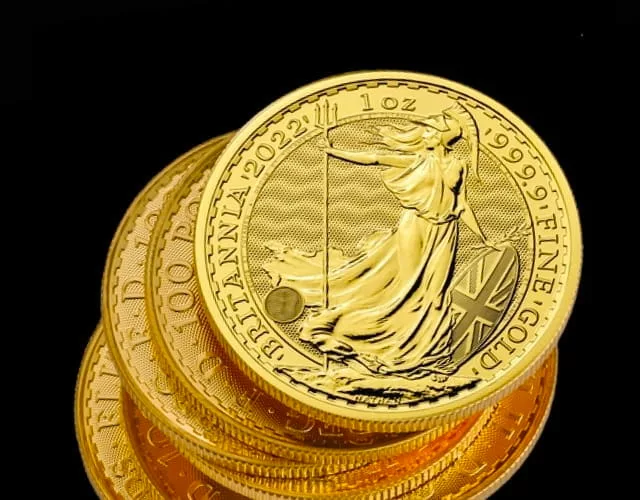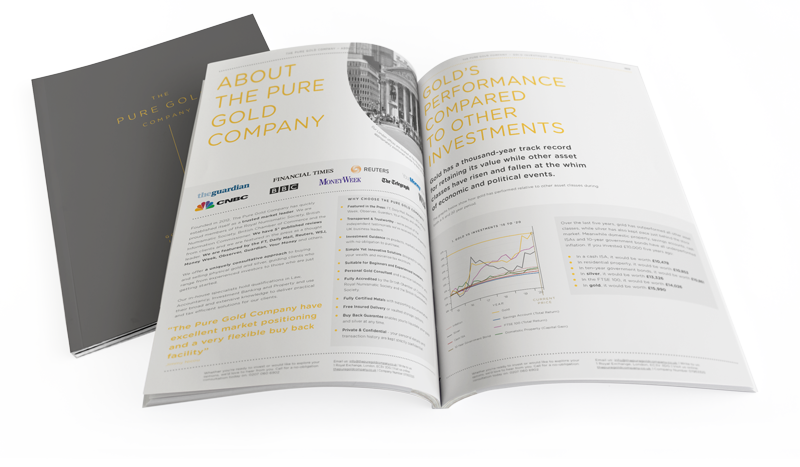Is it time to buy gold? When is the best moment to invest in gold? It is true that gold is typically thought of as a secure investment, but when should you buy?
Investment decisions should be carefully considered, and the decision to buy gold is no different. Is it better to buy now or wait for a while? What should you consider when choosing to invest in the precious metal? Below are a few helpful questions to ask before you take the plunge.
Why do gold prices increase?
The gold price rises when demand outstrips supply. This occurs when buyers perceive a greater risk to their assets and look for a safe-haven investment like gold to protect themselves. These risks include geopolitical factors like war, the threat of war, or global instability. Global economic factors also affect the value of products, assets, or investments. The risk can be overt and immediate, like the unprecedented global lockdowns at the start of the pandemic or the invasion of Ukraine. There are also more subtle and insidious factors like the rising tide of inflation, interest rate movements, and the US dollar value.
Do any of these risks seem apparent now in 2022?
Many of these risks are apparent now in 2022. The two most significant are the Ukraine war and inflation.
The Russian invasion has had a significant effect on gold prices already. In February, as troops mounted on the Russia/Ukraine border, the anticipation of an attack lifted demand for the yellow metal. As the invasion has continued, gold prices have climbed, reaching above $2,000 an ounce in March and nearing record highs set in August 2020.
World Events and Political Uncertainty
It’s not just the destabilisation of the geopolitical environment that has propelled gold prices upwards. The far-reaching effects of the war go well beyond the conflict borders.
Russia’s essential gas and oil supplies to Europe are in jeopardy, and Ukraine’s substantial nutritional contribution to world food supplies is also now curtailed. The result is a global surge of inflation that hasn’t been seen in decades, initiated by pandemic supply chain disruption but now fuelled by the fallout of war.
The result is a global surge of inflation that we have not seen in decades. This was caused by the pandemic and supply chain disruption, but it is getting worse because of the fallout of war.
Financial Markets
The effect of war and inflation on other popular assets like stocks has been negative, with US stocks tumbling as inflation has become more entrenched, and the Federal Reserve’s monetary policy has tightened. UK stocks have also been in retreat, sliding as the war began, recovering some ground in March and April, and then sliding again as the reality of higher inflation and interest rates became clearer.
Is it possible that these risks are likely to increase?
Market sentiment expects inflation to continue to rise for some time. Politicians and economists insisted through most of 2021 that inflationary pressure was transitory. Still, they have been roundly disabused of that notion as inflation has reached 40-year highs and is expected to climb further. UK inflation is already at 7% and likely to go above 10% this year. It is currently 8.3% in the US. This problem is not limited to just the US and Europe. Inflationary pressure is building, exacerbating political unrest in Sri Lanka and potentially igniting unrest in countries across the Middle East and Africa.
Even as governments have quickly tried to reduce the effects of inflation, it is clear this crisis is not yet at its peak, and the political, economic and social ramifications are yet to be fully understood.
How does gold perform in times of uncertainty?
Gold has a venerable history as a store of wealth. It has been used for thousands of years as a currency because of its rarity and elemental stability. It doesn’t tarnish, is relatively easy to melt to produce coins or other tradeable currency, and is rare to have an intrinsic value by centuries of civilisation. As a result, the precious metal has maintained its value even as fiat currencies and assets have fluctuated.
Discover Gold’s Unique Tax Advantage
Most investments are subject to some form of taxation, but physical gold can be totally free of VAT and capital gains tax.

Gold Price
Gold’s relationship with other investments like stocks, government bonds, and property is inverse. A slide in one prompts a surge in the other, but the correlation isn’t always absolute. Many things affect the price of gold and the volatility of the stock market, but most market declines have seen a flight to safe-haven assets like gold that have maintained or increased in value.
Financial Planning
Gold has historically also been a reasonable hedge against inflation over the long term. This is because its value rises as the cost of goods rises, and it can maintain purchasing power where the increasing price of goods has eroded currency under the mattress. While short term fluctuations in the gold price mean this relationship is not absolute, it is widely viewed as an inflation hedge.
Gold Investments
The advantages of physical gold enhance its safe-haven status. There is no counter-party risk of the company or bank going bust. In an actual financial crisis, bank deposits are only protected for up to £85,000 in the UK. A sudden market crash or significant banking crisis could cause overstretched institutions to fail.
In addition, certain types of physical gold coins are legal tender for UK residents. This means they don’t attract any capital gains tax when you come to sell them after weathering the economic storm. Gold Sovereigns and Gold Britannias can be held for any length of time and then sold without incurring any capital gains tax depending on individual circumstances, unlike Exchange Traded Funds or stocks.
Diversifying Your Portfolio with Gold
Gold’s inverse relationship to other assets means it can act as a valuable form of portfolio diversification. This is when you spread your investments across different asset classes to protect your wealth from market shocks.
A well-diversified investment portfolio can smooth out the bumps experienced by holding any one asset. In addition, including gold can help to protect your portfolio from losses in other asset classes.
Investors often choose to hold 10-15% of their portfolio in gold as a form of insurance. The optimum amount will depend on individual circumstances and investment goals.
Gold Investing – Is now the best time to buy gold?
The price of gold bullion has increased substantially over the last 20 years, but if you didn’t buy it 20 years ago, is now the right time to buy? Investors need to consider their motivation for buying gold. If it’s short-term speculative interest, gold comes with the same risks as any other asset.
Physical Gold
It’s essential to recognise that physical gold bars and gold coins are assets like any other. Their short-term performance is dependent on supply and demand. As a result, the value of your gold can just as quickly go down as up. So experienced investors tend to hold gold long-term as any short-term volatility is subsumed into long-term growth.
Investors can choose to wait if they think the gold price will fall in the short term, but long-term buyers of the precious metal shouldn’t wait too long to catch gold’s upward trajectory. Buying regularly will also accumulate a more extensive gold investment portfolio while smoothing over any price fluctuations.


